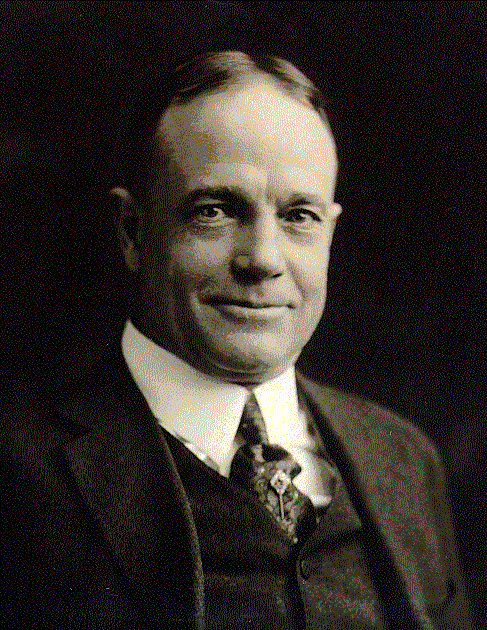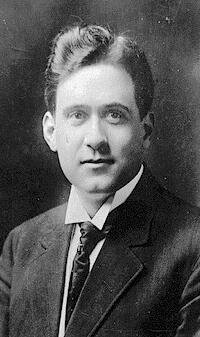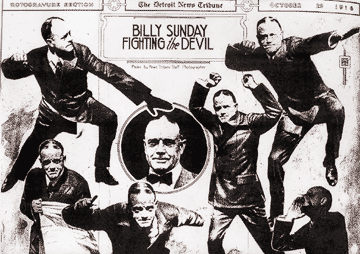|
FUNDAMENTALISM AND BILLY SUNDAY Liberalism and the Social Gospel failed to permeate every level of the country's religious and social life. Even mainline denominations demonstrated resistance, particularly in the south. In time, however, even southern mainline churches caved in to liberalism. Historians attribute resistance to liberalism to the clash between rural and urban values. In doing so, they fail to account for rejection of the liberal agenda by many ethnic denominations such as the Lutheran Church Missouri Synod, smaller denominational bodies, and the Fundamentalists. This page examines the origin and growth of fundamentalism, then examines the life and work of one of this movement's greatest evangelists. I. Fundamentalism The best description of fundamentalism, as it appears in the late nineteenth and early twentieth century, is to recognize it as orthodox Christianity. Fundamentalists continued biblical and supernatural Christianity when many denominations defected. One new factor contributes to fundamentalism's growth. It is the interest in dispensationalism. Dispensationalism and premillennialism go together but aren't synonymous. (Dispensational premillennialism is just one form of premillennial eschatology.) Dispensationalism is associated with John Nelson Darby, the founder of the Plymouth Brethren in Plymouth, England about 1830. Darby promoted a dispensational premillennial theology; a theology he reportedly obtained from Margaret McDonald. McDonald, who participated in a Scottish charismatic revival about the same time, received dispensationalism as part of a charismatic prophecy. One of Darby's students, C.I. Scofield, developed and popularized the view with his Scofield Reference Bible. W.E. Blackstone's work Jesus Is Coming also promoted the theory. American churches bought Darby's teachings because of this literature and Darby's repeated American visits. Those who accepted dispensationalism began gathering in conferences prior to the Civil War. The Niagara Bible Prophecy Conferences met in New York during the 1860s. Princeton Theological Seminary(1) and the Princeton theologians demonstrated consistent biblical orthodoxy during the later nineteenth century. Professors Charles Hodge and B.B. Warfield develop what became known as the "Princeton School." It is a mindset which is extremely conservative, biblical and orthodox. These two erudite men emphasize biblical inspiration, authority and inerrancy, positions which stand out in stark contrast to the Liberal and critical attacks on biblical veracity. By the 1890s, the "Princeton School" and the dispensationalists come together. Organizers of the prophecy conferences invite Hodge, Warfield, and others to speak. In 1895 the conferences issued a list of five points which they held as fundamental to the faith. Two wealthy businessmen provide funds for the production of twelve large tracts called "The Fundamentals." According to these scholars, Christianity's five fundamental points include:
Conservative Christians accepted these principles without question; even some of the mainline denominations formally accepted these points. The General Assembly of the Northern Presbyterian Church continued their affirmation of these standards until 1910. Itinerant evangelists also repudiate Liberalism. I don't classify D.L. Moody as a fundamentalist although he attended some of the prophecy conferences and identified with them. One of the best known evangelists is Reuben A. Torrey, a northern theologian and intellectual. We know Torrey best for his later move to the west coast where he established a "Moody Seminary" on the west coast, the Bible Institute of Los Angeles (BIOLA). Other evangelists recognized as fundamentalists include J. Wilbur Chapman and Rodney "Gipsey" Smith. II. Billy Sunday
Sunday developed an interest in sports during high school. He played high school baseball but soon joined a semi-pro team in Marshalltown, Iowa. Sunday contributed to the team's victory in the Central Iowa League championship. Sunday, who had speed, kept pitchers unsettled constantly with zany antics once on base. His antics and his speed enabled him to steal base after base. On several occasions he stole home to score. Cap Anson, a former big leaguer and Chicago Whitestockings (now the Cubs) scout, lived in Marshalltown. Anson saw Sunday play and, when asked, agreed to a try out with the Whitestockings. Anson believed Sunday a bush-leaguer so he lined him up for a race against the Whitestockings' fastest player. In a 100 yard dash Sunday beat his opponent by 15 feet. The Chicago team signed Sunday on the spot. Sunday played professional baseball for eight years. He began with unimpressive statistics but he ended his career with a lifetime batting average of .257 although he once hit a high of .350. A terror once on base, Sunday stole 94 bases in one 116 game season. In a game against the Philadelphia Athletics in Chicago, with the game tied 0-0 at the top of the ninth, Sunday caught three fly balls to retire the side. He led off and walked. On the first pitch to the next batter Sunday stole second, on the next pitch he stole third and on the next pitch he stole home. One other item of useless trivia, Billy Sunday was the first professional baseball player to circle the bases in 14 seconds. Sunday starred on the diamond, off the field he was a "rounder." In 1886, while on a drinking spree with friends, he found himself "in the gutter"--literally! A rescue mission band went by playing hymns. Reminded of his mother, Sunday picked himself up out of the gutter and followed the band to Chicago's Pacific Garden Mission. Mission workers ultimately led Sunday to Christ and he began attending a nearby Presbyterian Church. After his conversion, Sunday worked with the YMCA. In 1891, Sunday decided to go full time with the "Y" even though the Philadelphia Athletics offered him $500 a month to play ball. Sunday turned the offer down to take an $83.33 monthly salary at the "Y". Even then Sunday often found himself behind in salary. Nonetheless, he continued to work spending much time in Chicago bars inviting men to come to church. No, he didn't drink; he had become a tee-totaller. When the famous midwestern evangelist J. Wilbur Chapman needed an assistant he selected Sunday on the "Y's" recommendation. Sunday worked as Chapman's advance man. He made all the advance arrangements for Chapman's revivals. In the process he learned the "revival business" from the ground up. When Chapman took a ministry in Philadelphia in 1895, he had one revival meeting left--in Garner, Iowa. The Iowans asked Sunday to fill the date since Chapman was in Philadelphia. Sunday went and the rest is, as they say, history. Garner is today a small community of only 2300 in north central Iowa. By the end of Sunday's first meeting some 286 made decisions.
Sunday preached a crude style. He referred to himself as the "rube of rubes" because of his rural background. He gestured wildly and every sermon became a pantomime. He ran, jumped, skipped and gyrated all By the 1930s, Sunday's influence waned until many considered him a laughable hold over from the past. During his heyday, however, he was a force to be reckoned with. III. The decline of fundamentalism Fundamentalism took on negative overtones after World War I and lost much of its influence. Fundamentalism's "low mark" came at the Scope's trial in 1925. This famous "Monkey Trial" pitted Clarence Darrow against William Jennings Brian. Fundamentalism's doom occurred simultaneously with the fall of Princeton Theological Seminary in 1927. Liberals challenged J. Gresham Machen on his position of inerrancy and the school reorganized along Liberal lines in 1929. Machen left to form Westminster Theological Seminary. Conservative Presbyterians protested the handling of missionary outreach and formed other mission boards. Mainliners pushed out the conservatives. The conservatives then formed the Orthodox Presbyterian Church. In time Americans saw fundamentalism as an attempt to freeze American culture and to ignore all social issues save smoking, drinking and dancing. For many years fundamentalism was synonymous with anti-intellectualism and narrow thinking. Fundamentalism all but disappeared until the late 1970s. Jerry Falwell led the resurgence of fundamentalism with his publication Fundamentalist Journal. Modern fundamentalism combines basic conservative orthodox theology with dispensational premillennialism and an insistence on local autonomy.
______________ 1. Do not confuse Princeton Theological Seminary with Princeton University. Princeton University did have a Presbyterian controlled divinity school, but it was not PTS. |
 William Ashley Sunday was born November 19, 1862, in Ames, Iowa, to a middle class family. Sunday's father enlisted to fight in the Civil War. When Sunday was a month old, his father died in Missouri of camp disease. His mother tried to keep the family together but ultimately sent Billy to a soldier's orphanage. Sunday ran away to his grandfather's farm. He didn't like the farm any better, however, so he ran off again and worked his way through high school as a janitor.
William Ashley Sunday was born November 19, 1862, in Ames, Iowa, to a middle class family. Sunday's father enlisted to fight in the Civil War. When Sunday was a month old, his father died in Missouri of camp disease. His mother tried to keep the family together but ultimately sent Billy to a soldier's orphanage. Sunday ran away to his grandfather's farm. He didn't like the farm any better, however, so he ran off again and worked his way through high school as a janitor. Sunday's initial success convinced him to launch into full time evangelism. He first copied Chapman's style but soon developed his own. He watched other evangelists and adapted some of their styles to himself. By 1900, larger communities outside Iowa invited him to hold meetings. In 1901 he hired a singer and insisted revival organizers erect a wooden tabernacle for his meetings. In 1904, he had hired his own advance man as well as an architect to design the tabernacles and supervise their construc
Sunday's initial success convinced him to launch into full time evangelism. He first copied Chapman's style but soon developed his own. He watched other evangelists and adapted some of their styles to himself. By 1900, larger communities outside Iowa invited him to hold meetings. In 1901 he hired a singer and insisted revival organizers erect a wooden tabernacle for his meetings. In 1904, he had hired his own advance man as well as an architect to design the tabernacles and supervise their construc tion. Each tabernacle was inexpensively built with dirt floors. To keep down the dust, organizers covered the floors with sawdust, thus the phrase, "Hitting the sawdust trail." In 1909, he hired Homer Rodeheaver as his song evangelist; they spent 22 years together.
tion. Each tabernacle was inexpensively built with dirt floors. To keep down the dust, organizers covered the floors with sawdust, thus the phrase, "Hitting the sawdust trail." In 1909, he hired Homer Rodeheaver as his song evangelist; they spent 22 years together. over the place. He even smashed chairs in a "rage against Satan." He perspired freely. In an effort to cool off, he often removed his coat, tie and vest, and then rolled up his shirt sleeves. He mocked and chided the "dandy" preachers with their conservative style and demeanor. Sunday boldly attacked saloons striking out at them in nearly every sermon. After a campaign in Wilkes-Barre, Pennsylvania, bars closed for lack of business. He linked his message to patriotism. In one sermon, in no uncertain terms, he called upon God to damn the Germans (it was during World War I). When the government announced registration for the draft, Sunday purchased $25,000 worth of liberty bonds. In another sermon, he announced that if hell could be turned over it would be stamped, "Made in Germany!"
over the place. He even smashed chairs in a "rage against Satan." He perspired freely. In an effort to cool off, he often removed his coat, tie and vest, and then rolled up his shirt sleeves. He mocked and chided the "dandy" preachers with their conservative style and demeanor. Sunday boldly attacked saloons striking out at them in nearly every sermon. After a campaign in Wilkes-Barre, Pennsylvania, bars closed for lack of business. He linked his message to patriotism. In one sermon, in no uncertain terms, he called upon God to damn the Germans (it was during World War I). When the government announced registration for the draft, Sunday purchased $25,000 worth of liberty bonds. In another sermon, he announced that if hell could be turned over it would be stamped, "Made in Germany!" Brian, an astute politician who had run at least twice as a Populist presidential candidate, came off as an ignorant bigoted anti-intellectual slob. He really didn't come off that badly. In fact, he won the case. The media, however, particularly H.L. Mencken, painted him in hues of bigotry.
Brian, an astute politician who had run at least twice as a Populist presidential candidate, came off as an ignorant bigoted anti-intellectual slob. He really didn't come off that badly. In fact, he won the case. The media, however, particularly H.L. Mencken, painted him in hues of bigotry.